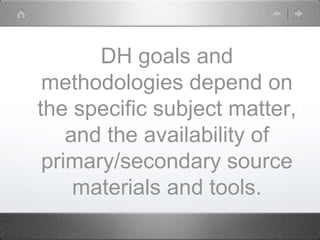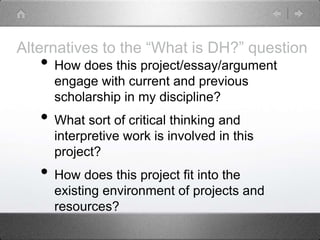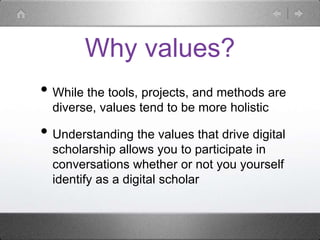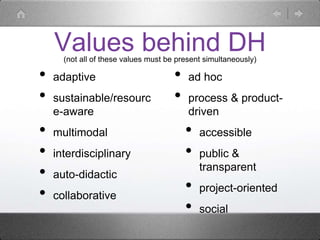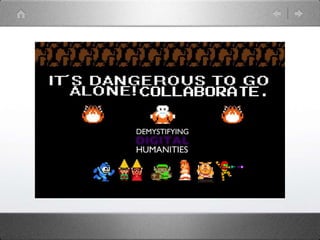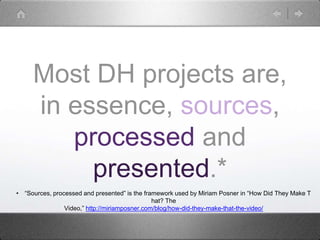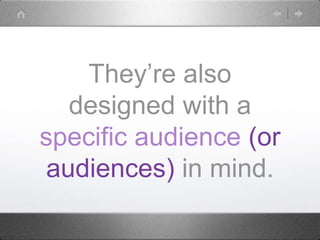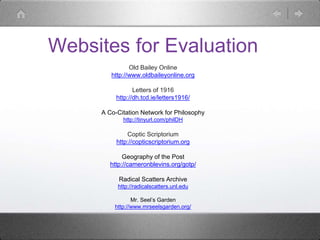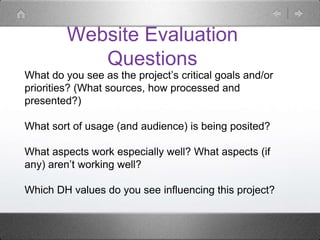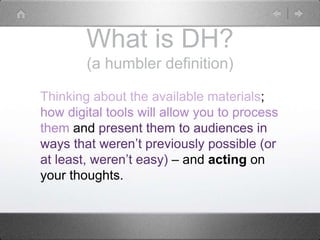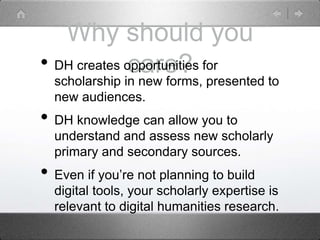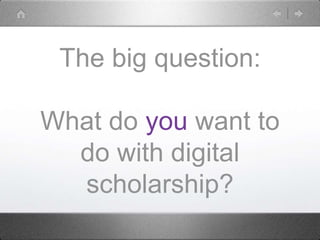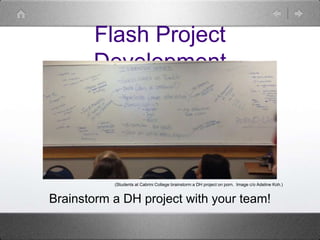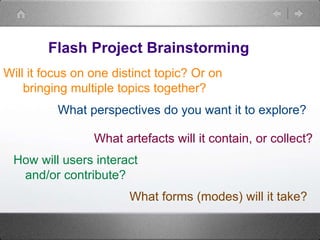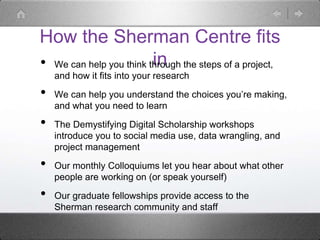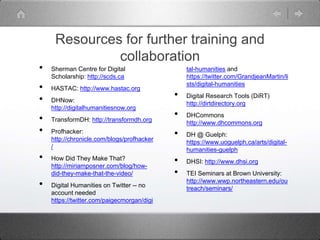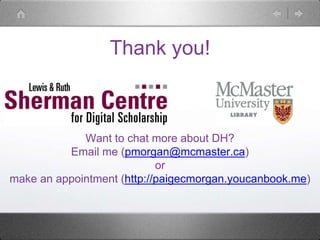Dmdh may 2015 - workshop 1
- 1. What are the digital humanities, and why should I care? Paige Morgan Sherman Centre for Digital Scholarship May 7, 2015
- 2. Goals: what I can do• Provide necessary background via these workshops and Sherman Centre website, events, and staff. • Allow you to begin charting your own course, and figure out what kind of engagement you want with digital humanities. • Make digital humanities a safer, less intimidating, and more welcoming space for experimenting. • Start building a digital humanities cohort at McMaster.
- 3. Limits: what I can’t do CAN BECOME A DIGITAL HUMANIST
- 5. The point of this workshop is not to convert you to digital humanities.
- 6. There is no single way of being a digital humanist.
- 7. Defining DH • By the start of the “first DH project” (1946, approximately: date of Roberto Busa’s plan for the Codex Thomisticus, a digital concordance of the works of Aquinas) • By its stability, or lack thereof, its self- consciously mutable and multimodal nature • According to its friction with traditional a.k.a. “analog” humanities
- 8. Defining DH • “the use of digital evidence, [and/or] methods of inquiry, [and/or] research, [and/or] publication and[/or] preservation to achieve scholarly and research goals.” (Scholarly Communication Institute, University of Virginia) • “research that uses information technology as a central part of its methodology, for creating and/or processing data.” (University of Oxford)
- 9. What others say “A term of tactical convenience.” --Matthew Kirschenbaum, U of Maryland “I think digital humanities is an unfortunate neologism, largely because the humanities itself is a problematic term.” --Trevor Owens, Library of Congress “I don’t. I’m sick of trying to define it. When forced to, I’ll make the referent the people instead of the ideas or methods - - Digital Humanities is the thing practiced by people who self- identify as Digital Humanists. It’s helpful to have a name for the field chiefly for institutional authority. Though granted I think it does involve coding/making/building/doing things with computers, things related to, you know, the humanities.” --Amanda French, Center for History and New Media All quotes from Debates in the Digital Humanities, edited by Matthew K. Gold, U of Minnesota Press, 2012 http://dhdebates.gc.cuny.edu/debates/text/40
- 10. DH goals and methodologies depend on the specific subject matter, and the availability of primary/secondary source materials and tools.
- 11. Alternatives to the “What is DH?” question • How does this project/essay/argument engage with current and previous scholarship in my discipline? • What sort of critical thinking and interpretive work is involved in this project? • How does this project fit into the existing environment of projects and resources?
- 12. Why values? • While the tools, projects, and methods are diverse, values tend to be more holistic • Understanding the values that drive digital scholarship allows you to participate in conversations whether or not you yourself identify as a digital scholar
- 13. Values behind DH • adaptive • sustainable/resourc e-aware • multimodal • interdisciplinary • auto-didactic • collaborative • ad hoc • process & product- driven • accessible • public & transparent • project-oriented • social (not all of these values must be present simultaneously)
- 15. Most DH projects are, in essence, sources, processed and presented.* • “Sources, processed and presented” is the framework used by Miriam Posner in “How Did They Make T hat? The Video,” http://miriamposner.com/blog/how-did-they-make-that-the-video/
- 16. They’re also designed with a specific audience (or audiences) in mind.
- 17. Websites for Evaluation Old Bailey Online http://www.oldbaileyonline.org Letters of 1916 http://dh.tcd.ie/letters1916/ A Co-Citation Network for Philosophy http://tinyurl.com/philDH Coptic Scriptorium http://copticscriptorium.org Geography of the Post http://cameronblevins.org/gotp/ Radical Scatters Archive http://radicalscatters.unl.edu Mr. Seel’s Garden http://www.mrseelsgarden.org/
- 18. Website Evaluation Questions What do you see as the project’s critical goals and/or priorities? (What sources, how processed and presented?) What sort of usage (and audience) is being posited? What aspects work especially well? What aspects (if any) aren’t working well? Which DH values do you see influencing this project?
- 19. What is DH? (a humbler definition) Thinking about the available materials; how digital tools will allow you to process them and present them to audiences in ways that weren’t previously possible (or at least, weren’t easy) – and acting on your thoughts.
- 20. Why should you care?• DH creates opportunities for scholarship in new forms, presented to new audiences. • DH knowledge can allow you to understand and assess new scholarly primary and secondary sources. • Even if you’re not planning to build digital tools, your scholarly expertise is relevant to digital humanities research.
- 21. The big question: What do you want to do with digital scholarship?
- 22. Flash Project Development Brainstorm a DH project with your team! (Students at Cabrini College brainstorm a DH project on porn. Image c/o Adeline Koh.)
- 23. Will it focus on one distinct topic? Or on bringing multiple topics together? What artefacts will it contain, or collect? How will users interact and/or contribute? What forms (modes) will it take? Flash Project Brainstorming What perspectives do you want it to explore?
- 24. How the Sherman Centre fits in• We can help you think through the steps of a project, and how it fits into your research • We can help you understand the choices you’re making, and what you need to learn • The Demystifying Digital Scholarship workshops introduce you to social media use, data wrangling, and project management • Our monthly Colloquiums let you hear about what other people are working on (or speak yourself) • Our graduate fellowships provide access to the Sherman research community and staff
- 25. Resources for further training and collaboration • Sherman Centre for Digital Scholarship: http://scds.ca • HASTAC: http://www.hastac.org • DHNow: http://digitalhumanitiesnow.org • TransformDH: http://transformdh.org • Profhacker: http://chronicle.com/blogs/profhacker / • How Did They Make That? http://miriamposner.com/blog/how- did-they-make-that-the-video/ • Digital Humanities on Twitter -- no account needed https://twitter.com/paigecmorgan/digi tal-humanities and https://twitter.com/GrandjeanMartin/li sts/digital-humanities • Digital Research Tools (DiRT) http://dirtdirectory.org • DHCommons http://www.dhcommons.org • DH @ Guelph: https://www.uoguelph.ca/arts/digital- humanities-guelph • DHSI: http://www.dhsi.org • TEI Seminars at Brown University: http://www.wwp.northeastern.edu/ou treach/seminars/
- 26. Thank you! Want to chat more about DH? Email me (pmorgan@mcmaster.ca) or make an appointment (http://paigecmorgan.youcanbook.me)

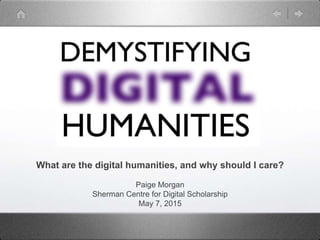
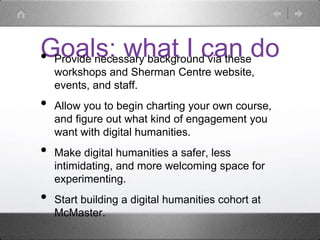
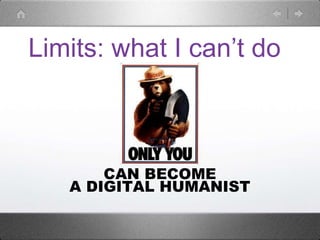
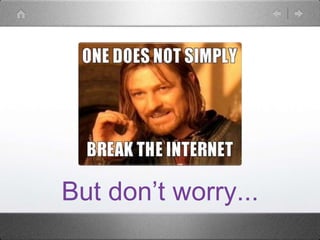
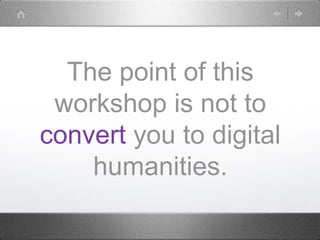
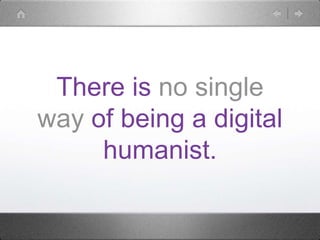
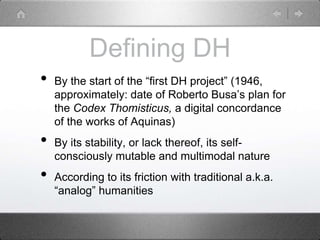
![Defining DH
• “the use of digital evidence, [and/or] methods
of inquiry, [and/or] research, [and/or]
publication and[/or] preservation to achieve
scholarly and research goals.” (Scholarly Communication
Institute, University of Virginia)
• “research that uses information technology as
a central part of its methodology, for creating
and/or processing data.” (University of Oxford)](https://image.slidesharecdn.com/dmdh-may2015-workshop1-150513172818-lva1-app6891/85/Dmdh-may-2015-workshop-1-8-320.jpg)

